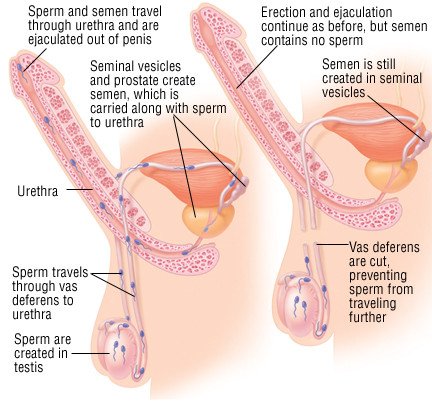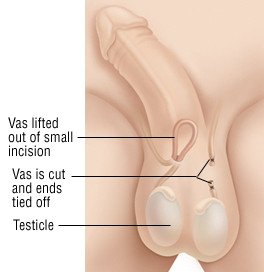Vasectomy
Medically reviewed by Drugs.com. Last updated on Feb 13, 2024.
What is a Vasectomy?

A vasectomy is a minor surgical procedure that is done to make a man sterile (unable to father children). The procedure is usually done by a urologist, a specialist who deals with the male reproductive system. A vasectomy cuts or blocks the vas defer="defer"ens, the tube that carries sperm away from the testicle to be added to semen. There are two vas defer="defer"ens, one for each testicle on each side. Once the vas defer="defer"ens are cut or blocked, sperm cannot pass from the place where there are manufactured, the testicle, to the reservoir where semen and prostatic secretions (secretions from the prostate gland) are stored. It is the combination of sperm and the secretions from the prostate that allow sperm to survive. During ejaculation, this sperm containing fluid is ejected through the ejaculatory duct and through the penis during orgasm. After a vasectomy, a man can continue to have normal erections, normal sexual intercourse and normal ejaculations of semen, but this ejaculate is sperm-free and cannot impregnate a female sexual partner.
|
|
About 500,000 vasectomies are done each year in the United States. This procedure usually takes only 15 to 20 minutes, and almost all vasectomies are done in the urologist's office or outpatient operating room.
A vasectomy is intended to produce permanent sterilization. Special microsurgery can reverse a vasectomy and restore fertility in some cases, but there are no guarantees that fertility or vasectomy reversal will be successful. This delicate procedure is expensive and is successful in only about 60-70% of cases. If you have even the slightest doubt about ending your chances for future fatherhood, then you should consider using another form of birth control which is more readily reversible. Although a husband does not need his wife's consent to have this surgery, it is appropriate for him to discuss his vasectomy with her beforehand.
What It's Used For
A vasectomy is used for male sterilization (birth control). Following a vasectomy, a man can continue to have normal erections, sexual intercourse, and ejaculation but he will not be able to father children. There is no change in sexual desire or libido following a vasectomy.
Preparation
Because vasectomy is almost always an outpatient procedure that is done with local anesthesia, you do not have to do anything to prepare. If for some special reason your vasectomy must be done under general anesthesia (you are unconscious during the procedure), your doctor will tell you not to eat or drink for a specific amount of time beforehand.
How It's Done
After a local anesthetic is used to numb the area in the scrotum (the sac that contains the testicles) the procedure will be done, the vasectomy is done using one of two methods:
- Traditional vasectomy – Using a scalpel, the surgeon makes one or two small incisions (cuts) in the skin of the scrotum (the sac that contains the testicles) near the base of the penis (one incision to reach the vas defer="defer"ens from each testicle). Once the vas defer="defer"ens are exposed, they are cut to prevent the ability of sperm to travel. Options include cutting the tubes and tying the ends, burning the tubes with a hot tool (electrocautery), or blocking them with surgical clips. The two small incisions in the scrotum are then closed with two or three small stitches.
|
|
- No-scalpel vasectomy – In this less-invasive approach, only tiny incisions are necessary. The surgeon makes one or two punctures to access the vas defer="defer"ens. The puncture is widened slightly, then the surgeon cuts or blocks each vas defer="defer"ens. The puncture site can be covered with a tiny dressing. No stitches are needed.
Follow-Up
After your vasectomy, you may feel some mild discomfort in the area. This usually can be relieved with an athletic support, an ice pack and nonprescription pain medication. There may be some black and blue bruising in the scrotal skin and groin. Many men choose to avoid strenuous activity for two to three days to lessen their discomfort. Your doctor also may advise you to abstain from sex for several days.
After your vasectomy, it will take from one to six months for all living sperm to pass out of your reproductive tract. Therefore, you will need to use another reliable form of birth control until your doctor confirms that you are sterile. This will be done by checking a semen sample for moving sperm. Your doctor will tell you when your semen is sperm-free.
Risks
Most men recover from a vasectomy without any problems. Occasionally, minor complications can occur, including infections, bleeding, bruising or swelling. In a few men, fluid will accumulate near the testicle or a small pocket of sperm will form under the skin. This usually will improve on its own, although sometimes a second surgery is needed to drain this fluid. Rarely, the first vasectomy will fail to completely sterilize the man, and the vasectomy will have to be repeated.
A few older studies have raised the concern that vasectomy could increase a man's risk of prostate cancer. However, recent research has failed to demonstrate any relationship between prostate cancer and vasectomy. The association was probably due to the fact that men who desired a vasectomy were older and were visiting a urologist who may have done a general urological evaluation that included testing for prostate cancer.
When To Call a Professional
After vasectomy, call your doctor immediately if:
- You develop a fever.
- Your vasectomy site leaks blood or pus.
- You develop significant pain or swelling at the vasectomy site.
Although a vasectomy should not interfere with a man's sexuality, a few men experience psychological difficulties that affect sexual performance. If this happens to you, don't be embarrassed to discuss the situation with your doctor.
Additional Info
Planned Parenthood Federation of America
http://www.plannedparenthood.org/
Further information
Always consult your healthcare provider to ensure the information displayed on this page applies to your personal circumstances.


